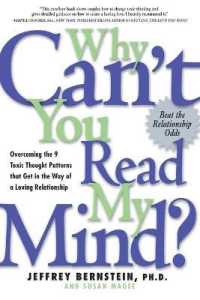- ホーム
- > 洋書
- > 英文書
- > Science / Mathematics
Full Description
Present day neuroscience places the brain at the centre of study. But what if researchers viewed the brain not as the foundation of life, rather as a mediating organ?
Ecology of the Brain addresses this very question. It considers the human body as a collective, a living being which uses the brain to mediate interactions. Those interactions may be both within the human body and between the human body and its environment.
Within this framework, the mind is seen not as a product of the brain but as an activity of the living being; an activity which integrates the brain within the everyday functions of the human body. Going further, Fuchs reformulates the traditional mind-brain problem, presenting it as a dual aspect of the living being: the lived body and the subjective body - the living body and the objective body. The processes of living and experiencing life, Fuchs argues, are in fact inextricably linked; it is not the brain, but the human being who feels, thinks and acts.
For students and academics, Ecology of the Brain will be of interest to those studying or researching theory of mind, social and cultural interaction, psychiatry, and psychotherapy.
Contents
Preface
Acknowledgements
Introduction
Part 1: Criticism of neurobiological reductionism
1 Cosmos in the head?
1.1 The idealistic legacy of brain research
1.2 First criticism: embodied perception
1.2.1 Perception and motion
1.2.2 The coextension of lived body and physical body
1.3 Second criticism: The objectivity of the phenomenal world
1.3.1 The space of perception
1.3.2 The objectivising achievement of perception
1.4 Third criticism: the reality of colours
1.5 Summary
2 The brain as the subjects heir?
2.1 First critique: the irreducibility of subjectivity
2.1.1 Phenomenal consciousness
2.1.2 Intentionality
2.1.2.1 Intentionality and phenomenal consciousness
2.1.2.2 Intentionality and representation
2.2 Second criticism: category mistakes
2.2.1 The mereological fallacy
2.2.2 The localisation fallacy
2.3 Third criticism: the powerless subject?
2.3.1 The unity of action
2.3.2 The role of consciousness
2.4 Summary: the primacy of the lifeworld
Part 2: Body, person, and the brain
3 Foundations: subjectivity and life
3.1 Embodied subjectivity
3.1.1 The body as subject
3.1.2 The dual aspect of subjective and physical body
3.1.3 The dual aspect of life
3.2 Ecological and enactive biology
3.2.1 Self-organisation and autonomy
3.2.2 Dependency and exchange between organism and environment
3.2.3 Subjectivity
3.2.4 Summary
3.3 The circular and integral causality of living beings
3.3.1 Vertical circular causality
3.3.2 Horizontal circular causality
3.3.3 Integral causality and its basis in capacities
3.3.4 The formation of capacities through body memory
3.3.5 Summary
4 The brain as organ of the living being
4.1 The brain in the context of the organism
4.1.1 The inner milieu
4.1.2 The feeling of being alive
4.1.3 Higher levels of consciousness
4.1.4 Embodied affectivity
4.1.4 Summary
4.2 The unity of brain, organism and environment
4.2.1 Linear versus circular organism-environment-relations
4.2.2 Consciousness as integral
4.2.3 Neuroplasticity and the incorporation of experience
4.2.4 Transformation and transparency: the brain as resonance organ
4.2.5 Information, representation and resonance
4.2.5.1 Information
4.2.5.2 Representation
4.2.5.3 Patterns and resonance
4.2.6 Conclusion: mediated immediacy
5 The brain as organ of the person
5.1 Primary intersubjectivity
5.1.1 Prenatal development
5.1.2 Intercorporeality and interaffectivity
5.1.3 Intercorporeal memory
5.2 Neurobiological foundations
5.2.1 The attachment system
5.2.2 The social resonance system (mirror neurons)
5.2.2.1 Foundations
5.2.2.2 Simulation or resonance?
5.3 Secondary intersubjectivity
5.3.1 The nine-month revolution
5.3.2 The embodied development of language
5.3.2.1 Language as social practice
5.3.2.2 Neurobiological foundations
5.3.3 Outlook: language, thought and perspective-taking
5.4 Summary: brain and culture
6 The concept of dual aspectivity
6.1 Mental, physical and life attributes
6.2 Differentiation from identity theories
6.3 Emergence 219
6.3.1 The primacy of function 219
6.3.2 Downward causality and dual aspectivity
6.4 Consequences for psychophysical relations
6.4.1 Intentional and psychological determination of physiological processes
6.4.2 Embodied freedom
6.4.2.1 A phenomenology of decision-making
6.4.2.2 Free will and integral causality
6.4.3 Psychosomatic and somatopsychic interrelations
6.5 Summary
7 Implications for psychiatry and psychological medicine
7.1 Neurobiological reductionism in psychiatry
7.2 Mental disorders as circular processes
7.2.1 Vertical circularity
7.2.2 Horizontal circularity
7.2.3 Synopsis
7.3 Circular causality in pathogenesis
7.3.1 Etiology of depression
7.3.2 The development of vulnerability
7.3.3 Summary
7.4 Circular processes in therapy
7.4.1 Somatic therapy
7.4.2 Psychotherapy
7.4.3 Comparison of therapeutic approaches
7.5 Summary: the role of subjectivity
8 Conclusion
8.1 Brain and person
8.2 The scope of neurobiological research
8.3 Naturalistic versus personalistic concept of the human being
References
Register








